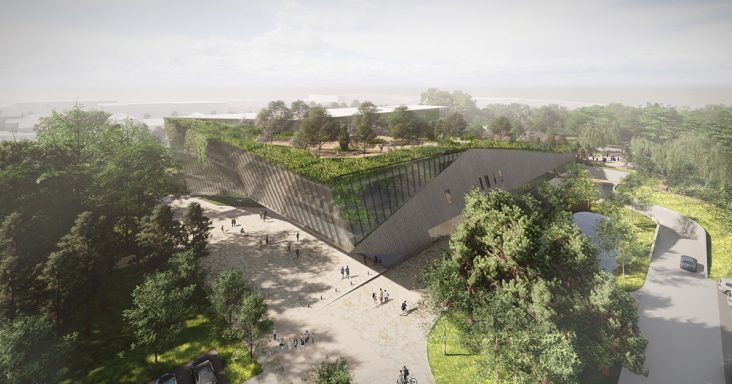Alice L. Walton School of Medicine breaks ground in Bentonville
by March 30, 2023 5:02 pm 8,832 views

Rendering of Alice L. Walton School of Medicine in Bentonville by Polk Stanley Wilcox and OSD.
Walmart heir and philanthropist Alice Walton celebrated with healthcare providers, construction crews and interested stakeholders Thursday (March 30) at the groundbreaking for the Alice L. Walton School of Medicine (AWSOM) in Bentonville.
Walton modestly said she did not like the name of the school but the acronym “AWSOM” she does love.
“I have attended many groundbreakings in my 73 years, but this one is the most emotional for me by far. Myself and family and so many people have been trying to get a medical school here for more than 30 years, and for this to be finally happening is really special,” she said.
Described as a “force of nature,” Walton is a doer, mover and shaker, according to Walter Harris, president of healthcare transformation for the Walton’s Whole Health Institute and AWSOM. He relocated from Pasadena, Calif., to oversee healthcare initiatives for nonprofits founded by Alice Walton, including the medical school.
Harris said he was drawn to the venture after spending more than 30 years in the healthcare field and seeing the need for a value-based outcome system. He said focusing on upstream services that can keep people healthier and out of the hospital so those who really need critical care can get it has to be the future. He said the biggest challenge to selling this model of healthcare will be to get physicians to buy into a value-based model, and not the standard volume-based system.
Harris said while the building phase is already underway for the medical school, there is tremendous work that goes on behind the scenes in assembling the faculty and administration and going through the multi-year accreditation process. The Alice L. Walton School of Medicine will be a 154,000-square-foot facility that blends art, nature, architecture, health and wellness and innovation together on one campus, Walton said. The total construction costs have not yet been disclosed.

THE MISSION
Dr. Sharmila Makhija has been selected as the founding dean and CEO for the medical school. Dr. Makhija is an Alabama native and said she feels at home in this community. She will officially begin her work at AWSOM on April 15.
“AWSOM will offer a 4-year medical degree with traditional medical curriculum adding the humanities and arts so that students can better understand and address the social determinant of health and to learn resiliency and ultimately provide the quality health care that our diverse community derives and needs,” Makhija said.
The inaugural class of 48 medical students will be selected in late 2024, provided the accreditation process goes as planned. The school plans for half of the students to be from Arkansas, and classes are expected to begin in late 2025. The plans for a medical school were first mentioned by Walton in 2020. The Whole Health Institute was formed to try and bring the community together around the mission to revamp how health care is given in order to provide better health and wellness outcomes.
“Our mission is simple, and that’s to make Northwest Arkansas a world-class destination for health and well-being, and that starts with retraining physicians. I am committed to health transformation in order to improve lives. We need better health care, lower costs, and support for our health caregivers. Patients need to be activated as stewards of their own health,” Walton said. “We can all agree we are spending too much on health care. … Every year, the outcomes become worse. The system is broken, and we have to fix it. Arkansas ranks 48 out of 50 states in health care. We can change it. We have quality care providers that are doing a great job, but we need a new approach that is proactive and connects patients’ mental, physical, social and emotional health.”
‘PIE IN THE SKY’
Dr. Ken Hopper was recently hired as assistant dean of health systems and science education. He said integrating behavioral health into the curriculum is a progressive but much-needed move. That’s what drew him to the organization from his post at Texas Christian University’s school of medicine.
“I would be an idiot not to come here and be part of this change. The team aspect of the staff is also amazing and sorely missed in other school settings,” Hopper said.
Hopper is one of six assistant deans who will direct the curriculum for the medical school.
Nelson Peacock, CEO of the Northwest Arkansas Council, said the timing of the medical school is great. He said the Council’s 2019 report showed the need for more specialty care as almost $1 billion a year leaves the region to seek specialty medical care. He said the Council’s healthcare task force continues to meet and work to get the community on board with the plans to make the region a destination for health and well-being. A medical school was a suggestion in 2019, which was seen at the time as “pie in the sky.”
“This is an important and historic day for sure for this region,” Peacock said.
Walton said the pandemic highlighted disparities and barriers and made an already a pressing issue even more urgent It also shined a light on the community’s readiness for action and change “the time is now and the place is here,”
BUILD OUT
Arkansas-based firm Polk Stanley Wilcox Architects is leading the building project on North J Street on a 14-acre tract near Crystal Bridges Museum of American Art. The building design features four levels and will include learning halls, a public gallery, library, clinical teaching spaces, administrative offices, a student lounge, theater, recreation and wellness areas, and underground parking as well as an entry-level parking area for visitors.
“We’re excited about the transformational impact that this site-responsive building and surrounding park will have for the community,” said Wesley Walls, principal at Polk Stanley Wilcox. “And we’re eager to witness how its innovative design will impact and equip future generations of health care professionals and the well-being of Arkansans.”
Conceived as an extension of the surrounding forest, the school’s trails extend onto the School’s campus to support biking, stewardship of regional ecology, and community connections. The site’s landscape features include healing gardens, outdoor classrooms, urban farming space, and a rooftop terrace that connects to a cafe and amphitheater.
